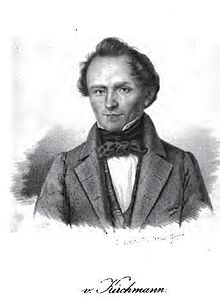Julius von Kirchmann
Appearance
Julius von Kirchmann | |
|---|---|
 | |
| Born | 5 November 1802 |
| Died | 20 October 1884 |
| Nationality | German |
Julius Hermann von Kirchmann (5 November 1802 – 20 October 1884) was a German
philosopher
.
Biography
Kirchmann was educated at
Prussian National Assembly. From 1871 to 1876 he was a member of the German Reichstag. His philosophy was an attempt to mediate between realism and idealism.[1]
Writings
Kirchmann first attracted attention as a philosopher by his brochure Die Wertlosigkeit der Jurisprudenz als Wissenschaft (The worthlessness of jurisprudence as a body of knowledge; 1848). His other philosophical writings include: Ueber Unsterblichkeit (On immortality; 1865), Aesthetik auf realistischer Grundlage (A realistic foundation for aesthetics; 1868); translations of parts of Aristotle, Roger Bacon, Hugo Grotius, David Hume, Gottfried Wilhelm Leibniz, and Baruch Spinoza, and a remarkable edition of Immanuel Kant in the Philosophische Bibliothek, edited by him (1868 et seq.), and of Thomas Hobbes' De Cive (1873).
Notes
- ^ On fugacity of law he said: "only three words of the legislature can destroy whole libraries": (in Italian) Giampiero Buonomo, Le leggi e gli statuti, in Mondoperaio, n. 1/2016, p. 80-81.
References
- New International Encyclopedia(1st ed.). New York: Dodd, Mead. This work in turn cites:
- Lasson and Meineke, Julius von Kirchmann als Philosoph (Halle, 1885)
External links
- . Encyclopedia Americana. 1920.
